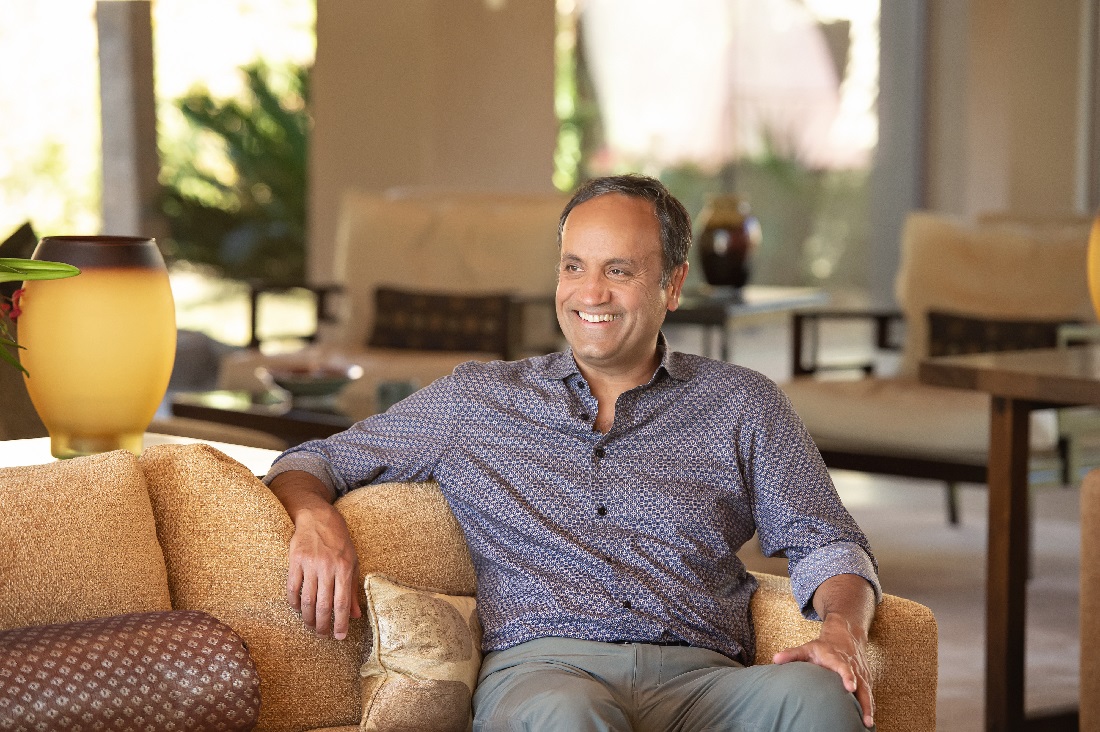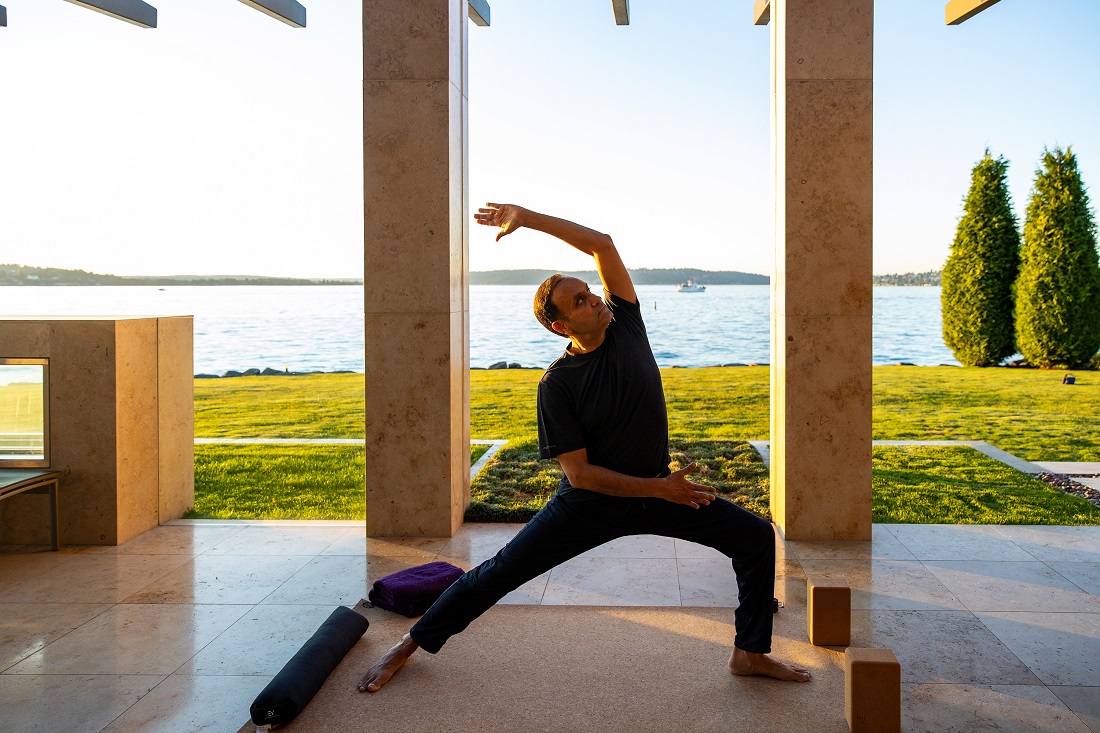
RoundGlass founder Sunny (Gurpreet) Singh speaks about his journey as an entrepreneur, philanthropist and a wellbeing seeker.
Sunny (Gurpreet) Singh began his entrepreneurial journey in 1996, when he launched the healthcare technology company Edifecs. Under his stewardship, the company to become a market leader in the US healthcare technology space, with more than 350 healthcare customers and serving more than 215 million lives. One thing the Punjab, India, -born entrepreneur realized while building a healthcare unicorn is the need to transform the existing reaction-based approach in the health sector to one based on prevention and treatment.
With that in mind, Singh launched his second company, RoundGlass, in 2014. The mission of the company is to promote global “Wholistic Wellbeing” by empowering and enabling people on their wellbeing journey. RoundGlass believes in inspiring the power of Wholistic Wellbeing to create a happier, healthier, and more joyful world. Toward that goal, it is investing in and developing new technology, sharing knowledge, and focusing on action for the good of the individual, their community, and the wider world.
Through RoundGlass, the Seattle-based Singh is on a mission to democratize Wholistic Wellbeing — wellbeing across dimensions such as physical, mental, spiritual, financial, professional, social, community, and planetary — for the world.
In an interview with the American Bazaar, the Indian American entrepreneur and philanthropist speaks about his journey.
Q: You built a unicorn in the health-tech space. Later, you set up RoundGlass, a “Wholistic Wellbeing” company. Why did you shift from healthcare to wellbeing?
The move from healthcare to wellbeing is an organic one given the deep links between health and wellbeing. I was aware of this profound connection even while heading Edifecs, a healthcare technology company I set up in Seattle in 1996. During that time, I became intimately familiar with the healthcare system. I realized that it was hinged on providing “sick care” instead of the preventive aspect of health. Correcting this skewed focus in healthcare became my next goal and inspiring people to embrace Wholistic Wellbeing became my mission. RoundGlass, my second venture, emerged from this vision in 2014. It is a global organization dedicated to democratizing Wholistic Wellbeing for the world.
At RoundGlass, we address wellbeing across “eight pillars” Wholistic Wellbeing — physical, mental, spiritual, financial, professional, social, community and planetary. We want to bring the ways of means of living a life of Wholistic Wellbeing to people across the world. We want to show them how to live, take them along on this journey of seeking wellbeing through the best teachers, authentic content, and technology-led solutions.
Q: How would you summarize your entrepreneurial journey so far?
It has been a rollercoaster ride, complete with ups and downs, as well as a humbling learning experience. After completing my master’s degree in the US, I started my corporate career in with companies such as Expeditors International and Microsoft. But I always nursed strong entrepreneurial ambitions and soon gravitated towards setting up my own enterprise. I started Edifecs out of my small condo in Seattle at the age of 32. At one point, I, along with my team, brought the company back from the edge of bankruptcy. Today, Edifecs is a market leader in the healthcare technology space in the US. Eighteen years later, I set up RoundGlass.
I have learned many lessons along the way, the biggest being that you should follow your passion and invest in or be associated with causes you believe in. It is vital to be empathetic to people around you, to listen to your team, and to forge real connections with them. It’s also essential to cultivate self-discipline and be mindful of your own and others’ wellbeing. As a leader, you must walk the talk and be able to take risks. Having the courage to do what you say makes you stronger, both as an individual and as a leader.
Q: You refer to yourself as a “wellbeing seeker”. What kind of wellbeing are you looking for and why do you spell holistic with a ‘W’?
I became a wellbeing seeker in my quest for a happier, healthier, more harmonious life. Once I adopted wellbeing — yoga, meditation, eating mindfully, giving back, maintaining strong social connections, and caring for our planet — I saw how it improved my life. Today, at 57, I can proudly say that my best years are ahead of me.
Wellbeing needs an integrated approach. To attain overall wellbeing, you need to experience a feeling of ‘wholeness’, which is achieved by focusing on not just individual wellbeing but also that of the community and the planet. That’s why we write holistic with a ‘W’.
Q: Philanthropy is an important part of your life and work. What inspires you to give back to society?
For me, giving back is an essential personal ethic — everyone can and must give back, in whatever way they can. It’s something I saw my parents do when I was growing up in a humble, lower-middle-class family in India. I am familiar with the struggle to survive, the huge inequalities that exist in society, the lack of access to even basic healthcare and livelihood — that’s why I believe in the power of philanthropy to change lives.
I also believe every corporate should take ownership of at least one social problem and work to solve it. That way, there will be a day when there are no problems left in the world. At RoundGlass, we are doing this through our social impact initiatives — the RoundGlass Foundation, RoundGlass Sports, and RoundGlass Sustain — focused on the good of both individuals and communities. My goal is not only to improve the lives of people in India but also to provide an innovative new model for proactive philanthropy to corporates across the world.

Q: Could you please tell us a bit more about these social initiatives?
RoundGlass has invested in social initiatives in the field of sports, sustainability, and community development. These are:
RoundGlass Foundation: The RoundGlass Foundation is committed to improving the quality of life of people in under-served communities of Punjab by building self-reliance and co-existence while focusing on ecological sustainability. It runs several on-ground initiatives around children’s education and sports, livelihood generation, women’s empowerment, sanitation, reforestation, and plantation. Till date, the Foundation has empowered individuals and communities in 1,100 villages of Punjab; its long-term vision is to reach all 12,700 villages in the state.
RoundGlass Sports: RoundGlass Sports is working to bring children to the playground and give them opportunities to excel in sports such as football, hockey, and tennis. The RoundGlass Punjab Football Club, which boasts a First Team, has been making a mark in the I-League since 2021. Through its Grassroots, Development, and Talent programs, it is identifying talent across the country, building infrastructure, equipping kids with world-class gear, and providing them training from the best coaches. In the process, it is transforming their lives as well as these sports.
RoundGlass Sustain: Through stories, videos, and captivating images, RoundGlass Sustain strives to inspire love for India’s biodiversity and to help human beings deepen their relationship with the natural world. It has more than 24 million impressions through its website, newsletter, and social media channels. The website hosts more than 1500+ pieces of content, which have been widely shared and recognized at global platforms such as COP26. Recently, the department of science and technology of the Government of Rajasthan collaborated with RoundGlass Sustain for a science film festival.
Q: A lot of these initiatives are based out of Punjab, India, why? What is your vision for Punjab?
I grew up in India, and spent my early childhood in Punjab, where I was born. The philosophy of giving back is deeply entrenched in the way of life there and I imbibed the same from my family and community. So, when I returned to India in 2015, it was but natural for me to start with giving back to my home state. I have a vision for Punjab — to make it a healthier and more vibrant state by applying the principles of Wholistic Wellbeing. We are doing this through our various on-ground initiatives in sports and education for children, health and hygiene, sanitation, reforestation, women’s empowerment, and by building self-reliant communities that live in harmony with nature.
Q: What wellbeing practices do you follow and why? In what ways have these helped you?
For me, wellbeing is a way of life and not a set of isolated practices. Yoga and meditation are part of my daily practice, as are eating mindfully, expressing gratitude, giving back, interacting with people from different backgrounds, and exploring different places and cultures. All these things together help me lead a balanced and whole life.
Q: What is the single most daunting wellbeing challenge that people across the world are facing right now and how can we cope with it?
Most people across the planet have forgotten how to live — to take care of their own wellbeing and that of their families; spending time connecting with nature and the community; living in the present. We are constantly chasing personal and professional goals, stressed by the frenzied pace of modern life. When you live like that, something’s got to give, and usually it’s our health and wellbeing. Most people are struggling with stress, anxiety, and sleep disorders; lifestyle diseases such as diabetes, obesity, and cardiac disease are on the rise. Embracing Wholistic Wellbeing practices can go a long way in helping us address these issues and in healing us and our world, each day, one small step at a time.
Q: What and who have influenced your belief in Wholistic Wellbeing and why?
My parents and the community I grew up in have been my biggest wellbeing influencers. From my father, I learnt the importance of sports and of contributing meaningfully to the community. A veteran field hockey player, he coached over a dozen Olympians and international hockey players from India and is now dedicated to helping rebuild the culture of sports in Punjab. In recognition of his life-long work towards field hockey, he was presented with the Dronacharya Award — the topmost sports coaching honor in India — last year by the government of India.
My mother has been a strong influence in my life. She initiated me to Wholistic Wellbeing practices and lay the groundwork for my life’s mission. The life education I received from her — from mindful eating and parables of traditional Punjabi wisdom to treating others with respect, compassion, and empathy — is now part of the RoundGlass framework of Wholistic Wellbeing.
Along the course of life, I have also imbibed learnings from wellbeing experts and teachers, entrepreneurs, and other wellbeing seekers — about the importance of mindfulness, investing in causes you believe in, resilience, the importance of workplace wellbeing and teamwork, etc.




1 Comment
My consciousness resonates with this Wholistic daily practice. With gratitude, respect and support.